In my Midwest, Christian middle school I learned about manifest destiny and westward expansion. I was a wide-eyed youngster, listening to glorified stories of Lewis and Clark and the California Gold Rush. We spent weeks creating models of wagons traversing the Oregon Trail.
History.com tells us that “Manifest Destiny, a phrase coined in 1845, is the idea that the United States is destined—by God, its advocates believed—to expand its dominion and spread democracy and capitalism across the entire North American continent. The philosophy drove 19th-century U.S. territorial expansion and was used to justify the forced removal of Native Americans and other groups from their homes. The rapid expansion of the United States intensified the issue of slavery as new states were added to the Union, leading to the outbreak of the Civil War.”
“Growing a culture requires a good storyteller. Changing a culture requires a persuasive editor.”
― Ryan Lilly
-2.png?width=325&name=050521_Deanna%20Blog%20Quote%20(1)-2.png) I was in my thirties, working for a national, racial-equity focused, K-12 education transformation organization, when I learned the factual horror of Manifest Destiny: the murder, rape and attempted genocide of indigenous, American Indian peoples, was rooted in white supremacy. Capitalist and white supremacist, colonizing ideologies purportedly justified atrocities by white people such as stealing land and stopping at nothing to dehumanize and commodify Black people via chattel slavery. Do you recall what you learned about this era of American history?
I was in my thirties, working for a national, racial-equity focused, K-12 education transformation organization, when I learned the factual horror of Manifest Destiny: the murder, rape and attempted genocide of indigenous, American Indian peoples, was rooted in white supremacy. Capitalist and white supremacist, colonizing ideologies purportedly justified atrocities by white people such as stealing land and stopping at nothing to dehumanize and commodify Black people via chattel slavery. Do you recall what you learned about this era of American history?
What happens to a nation's soul if we don't learn and know true history?
You may ask what Manifest Destiny has to do with leadership and learning: everything.
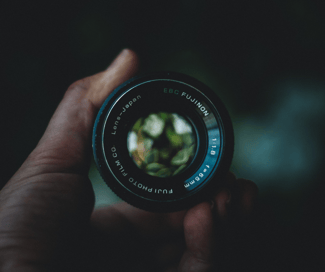 Inequitable outcomes are deeply rooted in historic and current systems of oppression. These systems are complex. Systemic outcomes result in what they were designed to produce, as we see today in racialized and inequitable outcomes in health care, education, housing, economic and other systems. Everyone and everything is connected. Narratives about our past have significant impact on inequity today.
Inequitable outcomes are deeply rooted in historic and current systems of oppression. These systems are complex. Systemic outcomes result in what they were designed to produce, as we see today in racialized and inequitable outcomes in health care, education, housing, economic and other systems. Everyone and everything is connected. Narratives about our past have significant impact on inequity today.
National Equity Project supports our equity development via the Lens of Systemic Oppression:
''A 'lens' is a metaphor to communicate the idea of looking at an event, experience, and/or a set of data through a particular perspective. The extension of this metaphor being that one can look at what is occurring and construct an interpretation and a subsequent action based on the 'lens' being employed at any given time. Each of us views the world through a set of lenses everyday - it is how we read and make meaning of the world.
The lens of systemic oppression is a lens we intentionally employ to sharpen our focus on the ways in which any given form of oppression (race, gender, class, language, sexual orientation, etc.) may be negatively impacting people's ability to make progress on the things they care about and/or preventing individual or collective action toward the achievement of a particular goal.” Source: National Equity Project
“How you look at it is pretty much how you'll see it”
― Rasheed Ogunlaru
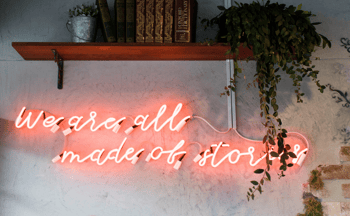 Dominant and counter narratives play into our ability to recognize systems of oppression. For example, in North America, particularly in the United States, a dominant narrative is the myth of meritocracy: the belief that one can pull themselves up by their bootstraps.
Dominant and counter narratives play into our ability to recognize systems of oppression. For example, in North America, particularly in the United States, a dominant narrative is the myth of meritocracy: the belief that one can pull themselves up by their bootstraps.
Limited lenses cause us to miss what is in front of us.
How do you see oppression show up in these four levels: individual, interpersonal, institutional, and structural? How have you been taught not to see?
I benefited from a strong K-12 school system. It was always expected that I’d go to university. My parents paid for most of my first car so I could get to and from my job in high school. They sacrificed significantly for years to pay half of my undergraduate tuition. Lenses of Systemic Oppression help me see my Individual Frame more clearly: I didn’t do it myself.
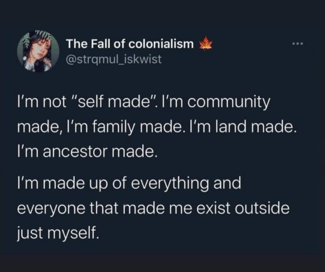 Yet we tend to not see it as legacy benefits or opportunities when it’s attributed to those of us with privilege. Our lenses are focused on individualism.
Yet we tend to not see it as legacy benefits or opportunities when it’s attributed to those of us with privilege. Our lenses are focused on individualism.
The dominant narrative myth of rugged individualism is so embedded in United States culture that it’s expected, it’s the norm, it’s so pervasive it’s almost invisible.
We don't exist in individualistic vacuums. Growing up, I had proverbial boots and bootstraps. Naming that any of my accomplishments are not my own is a credit to my community of supportive family members, friends, and partner. We all need community. It is a lie that we exist individually, earning things on our own merit.
Seeing the truth and complexity of our interconnectedness helps me breathe deeply. I experience abundance rooted in love, not scarcity.
 Research show that it takes 20 years to escape out of poverty, if there are no significant roadblocks along the way. Yet the narrative persists that in the United States you can accomplish anything on your own, be self-made. This narrative continues to blame individuals when they don’t succeed. It perpetuates the current power structure.
Research show that it takes 20 years to escape out of poverty, if there are no significant roadblocks along the way. Yet the narrative persists that in the United States you can accomplish anything on your own, be self-made. This narrative continues to blame individuals when they don’t succeed. It perpetuates the current power structure.
That leads us back to the Lens of Systemic Oppression. Why do these lenses matter?
“The purpose of using any given lens is to improve the predictability of our actions relative to a desired outcome. We believe we increase the likelihood of successfully reaching a given set of objectives when we consider what is happening and what action to take from multiple perspectives - if we examine situations, relationships, practices, and policies, etc. using multiple critical lenses (inquiry, change management, adult learning, etc.). Learning about and applying the lens of systemic oppression is fundamental to coaching and leading for equity." -Lens of Systemic Oppression, National Equity Project
The Lens of Systemic Oppression framework helps us clearly see myths, such as meritocracy and individualism that blind us to oppression. Counter narratives tell a different story: a story of resistance, survival, thriving, community, connectedness, beauty and abundance. We must see clearly to lead well.
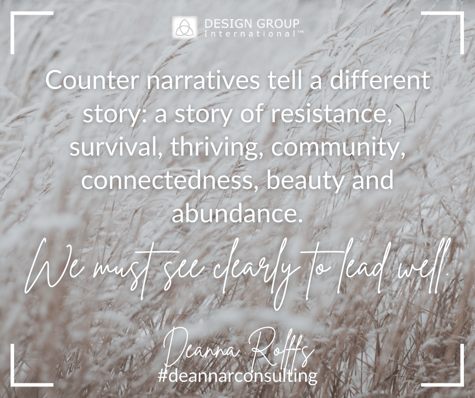
"You can’t teach what you don’t know.
You can’t lead where you won’t go."
― Malcolm X
Let’s increase our awareness of dominant narratives, notice, listen, learn, increase our aperture in our spaces of leadership to bring about justice and equity.
I wonder what specific disparities/inequities you are seeking to eliminate? Who are the people affected by the current inequity being discussed and are they at the table? How do we understand the forces behind the inequity we see? What forces are perpetuating the disparities we seek to address?” (Question stems adapted from National Equity Project)
I embrace the abundance of not knowing all answers. I seek clarity with openness. I'm so grateful we are in community together.
Fellow leaders and learners, I wish you courage and resilience for the journey.
Peace to you,


What I’m Reading & Watching
Regarding This Topic:
- WHAT IS SYSTEMIC RACISM? [VIDEOS] via race forward
- 4 Ways To Deconstruct Systems Of Oppression by Janice Gassam Asare via www.forbes.com
- 26 simple charts to show friends and family who aren't convinced racism is still a problem in America, by Gal, Shayanne Gal, Andy Kiersz, Michelle Mark, Ruobing Su, and Marguerite Ward via www.businessinsider.com

Questions for Consideration
Regarding This Topic:
- What are the potential unintended consequences of our proposed solutions/actions? Do the proposed solutions ignore or worsen existing disparities for the group in which we are focused?
- Who has power here? What is power based on here? How are relationships and power differentials affecting the truth that is told and constructed at any given moment?
- How are oppression, internalized oppression and transferred oppression playing out right here, right now (in me, in this group, in this organization)? What will I do about it?
- How safe is it here for different people to share their truth? Does the truth telling connect to shared purposes and commitments for action?
- How can I build my practice as a leader for equity starting with who I am and what I bring because of who I am?

Upcoming
Leadership & Learning Topics:
- Can’t We Call It Something Nicer Than White Supremacy?
Tags:
lens, individualism, learning, meritocracy, systemic oppression, racial equity, equity, leadership, dehumanization, counter narratives, dominant narratives, bootstraps
May 6, 2021


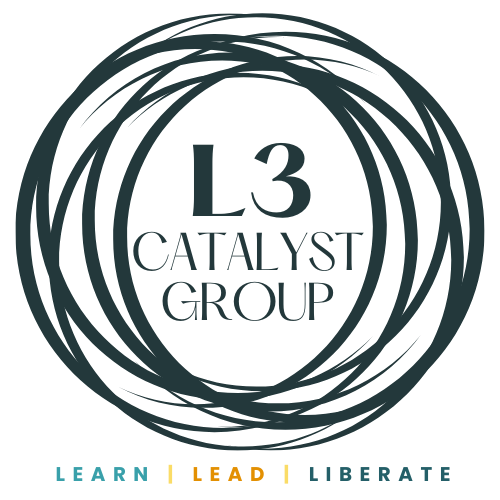
Comments